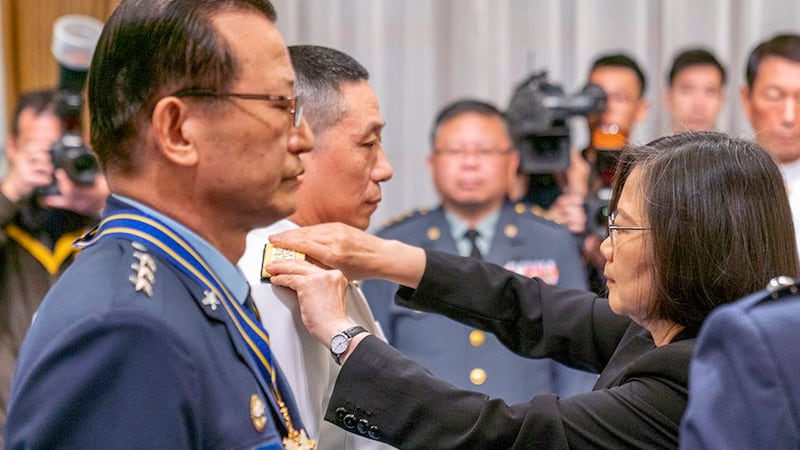U.S. national security adviser John Bolton has slammed China for an incursion into Taiwan’s airspace, reminding the Asian superpower of Washington’s “commitment” to the democratic island that Beijing regards as a renegade province which must be reunited with the mainland.
Taiwan’s defense ministry said two Chinese J-11 jet fighters crossed the center line in the Taiwan Strait around 11:00 a.m. on Sunday and entered the island’s southwestern airspace, coming within 185 kilometers (115 miles) of land, before Taiwanese jets were scrambled to warn them off.
Taiwanese President Tsai Ing-wen told reporters after the incursion that such acts were part of a bid by China to upset the status quo and posed a threat to regional security, and ordered any further provocation to be dealt with by force.
On Monday, Bolton also hit out at China in a tweet signaling Washington’s support for Taiwan amid the tension between Taipei and Beijing.
“Chinese military provocations won’t win any hearts or minds in Taiwan, but they will strengthen the resolve of people everywhere who value democracy,” Bolton said.
“The Taiwan Relations Act and our commitment are clear.”
Bolton’s comments were echoed Tuesday by the U.S. Department of Defense and State Department.
“The United States opposes unilateral actions by any party aimed at altering the status quo, including any resort to force or other forms of coercion and Beijing's efforts to unilaterally alter the status quo are harmful and do not contribute to regional stability but rather they undermine the framework that has enabled peace, stability, and development for decades,” the Pentagon said in a statement.
Consistent with the Taiwan Relations Act, the U.S. considers any effort to determine the future of Taiwan by “other than peaceful means,” including by boycotts or embargoes, “of grave concern,” the statement added.
“Taiwan is a reliable partner, a democratic role model, and a force for good in the world. The United States urges China to abstain from coercion that would jeopardize the security, or the social or economic system, of the people on Taiwan.”
The State Department went a step further, urging Beijing to “stop its coercive efforts and resume dialogue with the democratically-elected administration on Taiwan.”
Under the Taiwan Relations Act, the U.S. maintains a policy of supplying defensive arms to Taiwan and reserves the right to intervene militarily if China moves to unilaterally unify Taiwan with the mainland.
President Tsai rejected calls from Chinese President Xi Jinping on Jan. 2 to move towards "unification," saying that Taiwan's 23 million people have no wish to give up their sovereignty, and that China should first move towards a democratic system.
In the statement, titled “Letter to our Taiwan compatriots,” Xi was insistent that China must be “unified,” saying that Beijing would make no promises not to use military force to annex the island.

China responds
At a regular press briefing in Beijing on Tuesday, Chinese Foreign Ministry spokesman Geng Shuang dismissed Tsai’s comments on the weekend’s incident as “pure nonsense and indeed infuriating,” and referred additional questions to the government’s Taiwan Affairs Office.
But he took issue with the statements from the U.S. and said the Taiwan Relations Act “runs counter to the basic norms governing international relations,” as well as the three “joint communiques” recognized by the U.S. and China when the two nations reestablished diplomatic relations in 1979.
“We urge the relevant individuals in the U.S. to earnestly abide by the one-China principle and the provisions of the three China-U.S. joint communiques, and make efforts to advance our bilateral relations and cross-strait peace and stability instead of doing the opposite,” he said.
Taiwan was ruled as a Japanese colony in the 50 years prior to the end of World War II, but was handed back to the 1911 Republic of China under the Kuomintang (KMT) government as part of Tokyo's post-war reparation deal.
The island began a transition to democracy following the death of Chiang Kai-shek's son, President Chiang Ching-kuo, in January 1988, starting with direct elections to the legislature in the early 1990s and culminating in the first direct election of a president, Lee Teng-hui, in 1996.
Official exchanges between Beijing and Taipei have ceased since 2016 when Tsai was elected president and refused to acknowledge the one-China policy.
